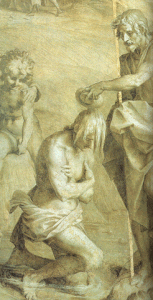Third Sunday in Advent (Jn 1:6-8, 19-28)

Sarto – John the Baptist
It is our nature, when confronted by darkness, to search for light, to illuminate our surroundings in order to see what lies before us. Our vocabulary is filled with expressions related to darkness and light, such as blindness and sight. When we learn something we say “I see”; when we have been working on some task for a very long time and the end is near we say “I see the light at the end of the tunnel”; or when we wish to exclude someone from some information we say that we are “keeping them in the dark.”
We also use darkness and light to define our emotional state. We use phrases such as “doom and gloom” to describe feelings of hopelessness and despair. For those who are depressed we tell them to “lighten up”.
Often we limit our vision by dimming or extinguishing the light; we take a “blind eye” to what lies in front of us because it is unpleasant or uncomfortable. We are blinded by what we want or don’t want to see. We put the blinders on and keep others in the dark every time we judge them by their appearance, their actions, or their speech. By keeping our distance and avoiding contact we place ourselves in darkness and reject the light of Christ.
For years a small marble statue stood in the entrance hall of the French Embassy in New York City. Parts of it were badly damaged but it had a quaint charm that made it a good conversation piece.
One day an art expert saw the statue and thought it matched the description of a long-lost statue by Michelangelo. After doing some research and analysis, it was determined to indeed be a statue of Cupid, an early work of the great master. It had stood in the entrance hall of the embassy for many years without ever being recognized.
What we do not know we cannot love; what we do not love will remain in the darkness and shadows. We are called to bring the light of Christ to those who live in the shadows and darkness of loneliness, fear, and despair. We have the opportunity to see ourselves and others more clearly, in a new light.
At this time of the year we are asked to remember the poor, those less fortunate, and to find ways to bring Christ into their lives. We are asked to look deeply within ourselves, to open our hearts to the light of Jesus, to remove the blinders and see what lies outside our comfort zone, to recognize Jesus in the people around us.
But the poor are found, not only outside our selves, but within our hearts and minds and spirit. We are the poor in spirit—in our sinfulness, our weaknesses, and our inability to love ourselves as God loves us. In order to bring light to others we must first dispel the darkness that blankets our souls; we must receive the abundant joy of Christ our Savior.
As we prepare to celebrate the coming of Jesus, we should remind ourselves that through the light of Christ we are called to bring light to those who in live in darkness so that all can receive the abundant joy of Christmas.
May the love and peace of our Lord Jesus Christ bring light and love to everyone, now and forever.
